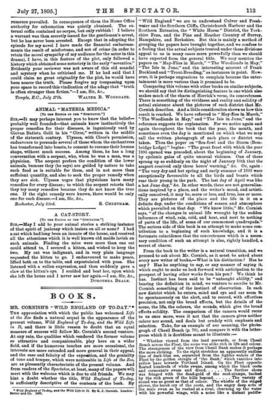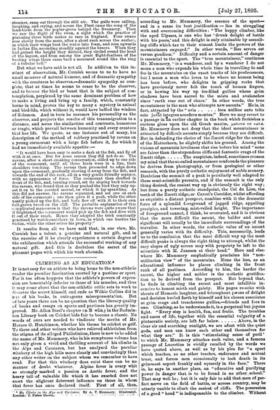BOOKS.
MR. CORNISH'S " WILD ENGLAND OF TO-DAY."* THE appreciation with which the public has welcomed Life at the Zoo finds a natural sequel in the appearance of the present volume, Wild England of To-day, and the Wild Life in It, and there is little reason to doubt that an equal measure of success will follow Mr. Cornish's second venture. At any rate, the qualities which rendered the former volume so attractive and companionable, play here on a wider field, and if the humorous touches are more occasional, the interests are more extended and more general in their appeal, and the ease and felicity of the exposition, and the geniality of tone and temper, which were noticeable in Life at the Zoo, are as pleasantly characteristic of the present volume. And from readers of the Spectator, at least, many of the papers will meet with the welcome which is due to old friends. We may hint a doubt whether the title, Wild England of To-day, is sufficiently descriptive of the contents of the book. By • Wild England of To-day, and the Wad Info in It. By C. J. Cornish. London : Seeley and Co. 1865.
" Wild England " we are to understand Culver and Fresh- water and the Southern Cliffs, Christchurch Harbour and the Southern Estuaries, the " White Horse " District, the York- shire Fens, and the Pine and Heather Country of Surrey, Hampshire, and Berkshire. But this is mainly a method of grouping the papers here brought together, and we confess to a feeling that the actual subjects treated under these divisione appeal to us in many cases more powerfully than we should have expected from the general title. We may mention the papers on " May-Flies in March," " The Woodlands in May," " The Isis in June," and the interesting account of Frank Buckland and " Trout-Breeding," as instances in point. How- ever, it is perhaps ungracious to complain because the enter- tainment is more various than it promised to be.
Comparing this volume with other books on similar subjects, we should say that its distinguishing feature is one which also makes much of the charm of Herrick's verse, its concreteness. There is something of the vividness and reality and solidity of actual existence about the pictures of each district that Mr. Cornish describes. And a little consideration shows us how this result is reached. We have referred to " May-flies in March,"
The Woodlands in May," and " The Isis in June," and the reference suggests the explanation. For we notice again and again throughout the book that the year, the month, and sometimes even the day is mentioned on which what we may call the written photograph of each place or district was taken. Thus the paper on "Sea-fowl and the Storm (Bern- bridge Ledge)" begins : "The great frost with which the year 1895 opened was preceded, about the beginning of January, by cyclonic gales of quite unusual violence. One of these sprang up so suddenly on the night of January 10th that the seaport received only three hours' warning," &c. Or, again "The very dry and hot spring and early summer of 1893 were exceptionally favourable to all the birds and beasts which rear their young in the park. The last day of April was like a hot June day," &c. In other words, these are not generalisa- tions inspired by a place, and the writer's mood, and artisti- cally conceived, it may be, more or less, and true, less or more. They are pictures of the place and the life in it on a definite day, under the conditions of season and atmosphere which prevailed on that day. " We know little," Mr. Cornish says, " of the changes in animal life wrought by the sudden influences of wind, rain, cold, and heat, and next to nothing of parts of the life, of some of our commonest quadrupeds?' The serious side of this book is an attempt to make some con- tribution to a beginning of such knowledge, and it is a fortunate coincidence that the concreteness which is a neces- sary condition of such an attempt is also, rightly handled, a secret of charm.
From the book to the writer is a natural transition, and we proceed to ask about Mr. Cornish, as it must be asked about every new writer of books,—What is his distinction ? Has he any P Has he anything to say, or any manner of saying it, which ought to make us look forward with anticipation to the prospect of having other works from his pen ? We think he has. Instinct has been said to be "untaught ability," and bearing the definition in mind, we venture to ascribe to Mr. Cornish something of the instinct of observation. In each new district which he enters, mind and eye and ear seem to be spontaneously on the alert, and to record, with effortless precision, not only the broad effects, but the details of the scene, the life, the colours, the sounds, which give the broad effects solidity. The comparison of the camera would recur to us once more, were it not that the camera gives neither colour nor sound, and deals but crudely with emphasis and selection. Take, for an example of our meaning, the photo- graph of Chesil Beach (p. 70), and compare it with the letter- press which it is doubtless meant to illustrate :- "Whether viewed from the land seawards, or from Chesil Beach across the Fleet, the scene was alike rich in life and colour. The strangeness of the view from Chesil Bank makes it perhaps the more striking. To the right stretches an apparently endless line of dark•blue sea, separated from the lighter waters of the Fleet by the golden shingle of 'the Bank,' which vanishes into yellow haze towards Portland Island. On the Fleet opposite floated hundreds of white swans, among which the black coots and cormorants swam and dived. The further shore was fringed with the dead-gold of the reed-stumps, backed by the rich green of the hills beyond The variety of sound was as great as that of colour. The whistle of the ringed plover, the harsh cry of the coots, and the angry deep note of the male swan as he rushed at a rival, churning up the water with his powerful wings, with a noise like a distant paddle- steamer, rang out through the still air. The gulls were calling, laughing, and crying, and across the Fleet came the song of the land-birds from the poplar-grove behind the Swannery. Then we saw the flight of the swan, a sight which the practice of pinioning these birds makes so rare in England. Four swans rose slowly from the mere, after a short rush across the surface., in which their wings beat the water into foam, and rose upwards in Indian file, ascending steadily against the breeze. When they had gained the height they desired, they circled round the head of the lagoon, and from among the great flight-feathers of the beating wings there came back a measured sound like the ring of a tubular bell."
But what we have said is not all. In addition to this in- stinct of observation, Mr. Cornish seems to us to have no small measure of natural humour, and of dramatic sympathy with the creatures he observes,—dramatic sympathy so com- Vete, that at times he seems to cease to be the observer, and to become the bird or beast that is the subject of con- templation, perplexed by the same dominant problem of how to make a living and bring up a family, which, constantly borne in mind, proves the key to many a mystery in animal and bird-life, which without it, would have baffled the wisdom of Solomon. And in turn he resumes his personality as the observer, and projects the results of this transmigration to a distance, and notes the similarities and contrasts, humorous or tragic, which prevail between humanity and every creature that has life. We quote, as one instance out of many, his description of the method of robbery practised by ravens on a young cormorant with a large fish before it, for which it had no immediately available appetite :— " It would have been easy to make a dash at the fish, and fly off with it at once. But for some reason they did not do so. The ravens, after a short croaking conversation, sidled up to one side of the cormorant, until all three birds were in a line, their shoulders touching. The ravens then proceeded to edge down upon the cormorant, gradually shoving it away from the fish, and towards the end of the rock, all in a very gentle friendly manner, with no appearance of force. The cormorant then shuffled in front of its fish, and, turning round, set its sloping back towards the ravens, who found that as they pushed the bird they only up- set it on to the coveted morsel, on which it lay sprawling. As this did not answer, the ravens separated, and sat one on each side of the cormorant ; one then gave it a push, while the other neatly picked up the fish, and both flew off with it to their own full-grown brood on the cliff. The probable explanation of this c ;mplicated manoeuvre is that the ravens were quite aware that if frightened the cormorant would pick up the fish and dive with it out of their reach. Hence they adopted the trick constantly practised by watch-snatchers in town, in which one hustles tke victim, while the other seizes his property."
It results from all we have said that, in our view, Mr. Cornish has a talent, a genuine and natural gift, and in the exercise of it he clearly experiences a certain degree of the exhilaration which attends the successful working of any natural gift. And this is doubtless the secret of the pleasant pages with which his work abounds.



































 Previous page
Previous page